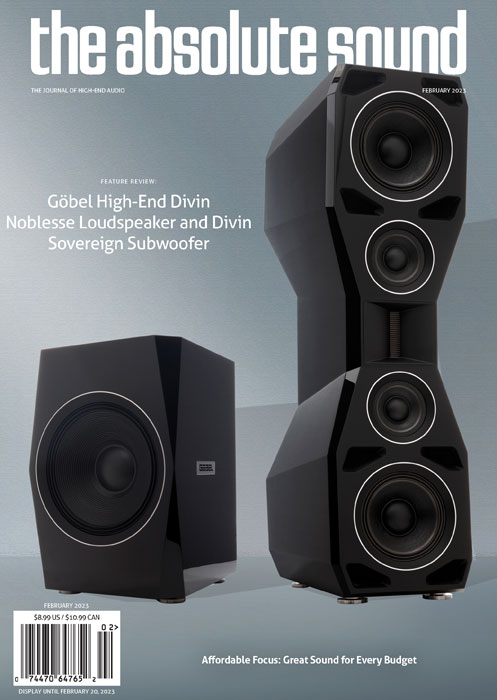|
|
| Home | High-End Audio Reviews | Audiophile Show Reports | Partner Mags | Hi-Fi / Music News | |
|
|
Celebrating 30 Years Of Service To Music Lovers |
The Absolute Sound February 2023
From
The Editor
Lies, Damn Lies, And Speaker-Sensitivity Specs
Consider a speaker's sensitivity as you an
amplifier's output power.
Editorial By Robert Harley

Most audiophiles pay more attention to an amplifier's power-output spec than they do to a speaker's sensitivity rating. Yet those two specs carry equal weight in determining how loudly a system will play.
Consider the Göbel Divin Noblesse speaker featured on this issue's cover. It has a sensitivity rating of 95dB — a very high figure. The Göbel will produce the same volume with a 30 Watt amplifier as an 86dB-sensitive speaker with a 240 Watt amplifier. In addition to needing less power, high-sensitivity speakers seem to confer certain sonic qualities that low-sensitivity speakers just don't deliver to the same degree, particularly the sense of lifelike immediacy and dynamic verve. It's not that low-sensitivity speaker can't sound dynamic and lifelike, only that these qualities seem to come more easily and universally to high-sensitivity designs, in my experience.
The importance of speaker sensitivity is often overlooked when choosing a system. To make matters worse, some speaker manufacturers have exploited a technical factor in the sensitivity specification to make their speakers appear to be 3dB more sensitive than they are. Driving a speaker of 3dB lower sensitivity is exactly equivalent to halving the amplifier power in terms of how loudly the system will play. If you bought what you thought was a 200 Wpc power amplifier, and it turned out to have only 100Wpc, that would be cause for concern. But if you bought a speaker that was 3dB less sensitive than you thought, would you be equally concerned? You should be.
Let's look at why, and how sensitivity specs have been abused.
Speaker sensitivity is measured by driving the speaker with one watt (1W) of power and measuring the sound-pressure level (SPL) one meter (1m) from the speaker. A sensitivity spec may read "89dB/1W/1m." Some manufacturers simply provide a number such as "89dB" rather than the full specification. Such single numbers are meaningless; be wary of sensitivity specs that don't include the test conditions.
But even the full specification can be deceiving. You will see some speakers' sensitivity rated when driven by 2.83 Volts rather than by one watt. With an 8-Ohm speaker, there is no difference between 2.83V and 1W. That's because 2.83V across 8 Ohms dissipates one watt of power in the speaker. But Ohm's Law tells us that 2.83V across a 4-Ohm speaker dissipates two watts of power. That's double the power, which we know is equivalent to 3dB. Voilŕ! The speaker suddenly appears to be 3dB more sensitive than it is. The speaker is simply drawing more power — twice as much — from the amplifier to achieve the specified sound-pressure level. The spec is technically accurate, but misleading if you don't understand the context.
This isn't to say that you should avoid 4-Ohm speakers whose sensitivity is measured with a drive signal of 2.83V, only that you should subtract 3dB from the sensitivity spec to find the speaker's true sensitivity to compare it with speakers measured without the "4-Ohm / 2.83V" trick.
I mentioned earlier that high sensitivity is a virtue apart from requiring a smaller (and less-expensive) power amplifier. The forces involved to make the speaker produce sound are greatly reduced in a high-sensitivity speaker. Let's compare the 95dB Divin Noblesse (which is specified accurately, I should add) to a speaker of 86dB sensitivity. In the Divin Noblesse, the thermal, magnetic, and electrical forces involved are one-eighth those of the forces required to create the same sound-pressure level in the lower-sensitivity speaker. It's intuitive that an electro-mechanical system working at one-eighth the forces is more likely to operate within its linear range.
For just one example, consider the phenomenon of "dynamic compression." As a driver's voice coil heats up its electrical resistance increases, reducing current flow and compressing dynamics, with the amount of compression constantly changing on a moment-by-moment basis. An electro-acoustic phenomenon is changing the score's dynamic markings; fff may be reproduced as ff, for example, even if for a moment. The multiple drivers in a three-way speaker will exhibit dynamic compression at different temperatures, changing the speaker's tonal balance from moment to moment.
Although you don't hear this directly as a change in tonal balance, this form of distortion creates an impression of strain on musical peaks, drawing our attention away from the music. The high-sensitivity speaker, which converts more of its electrical input into sound and less into heat, is less prone to this form of distortion. Other examples abound.
Next time you are choosing a speaker / amplifier combination, give as much consideration to the speaker's sensitivity as you to do to the amplifier's output power.
And watch for the "4-Ohm / 2.83V" chicanery.
— Robert Harley

Subscribe To
The Absolute Sound Magazine
Click here to subscribe to The Absolute Sound magazine.

 High-Performance Audio Reviews
High-Performance Audio Reviews















